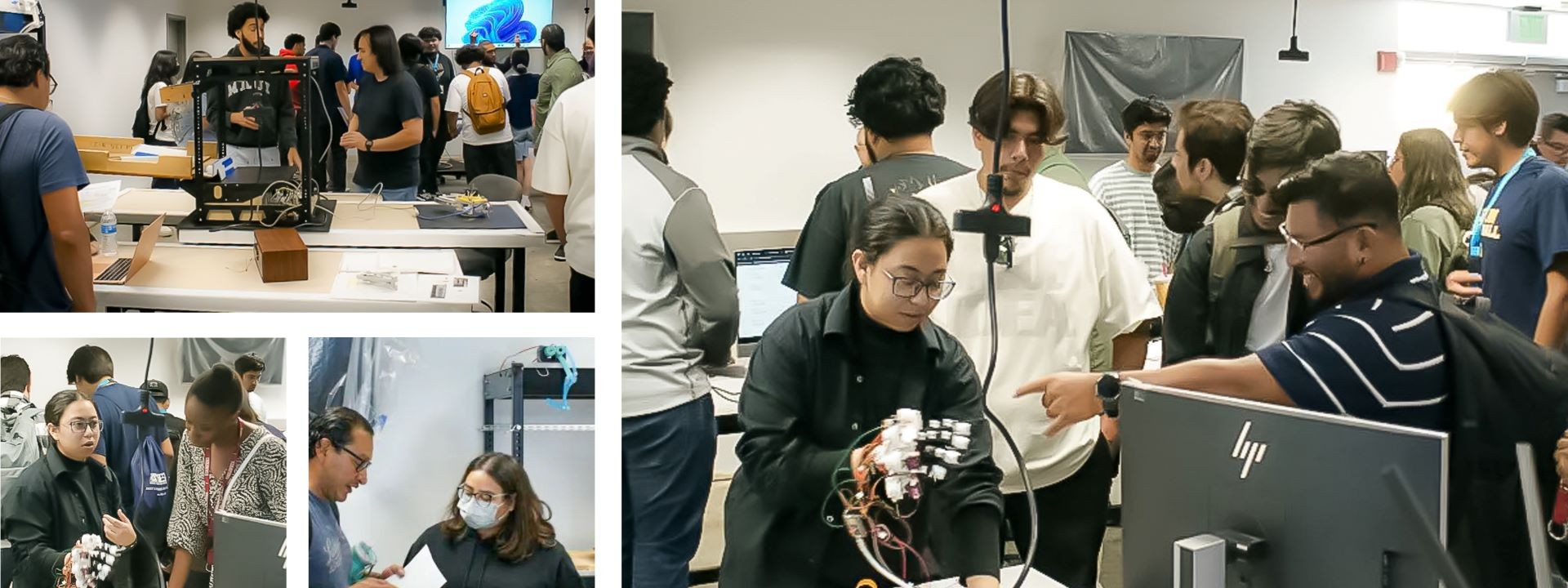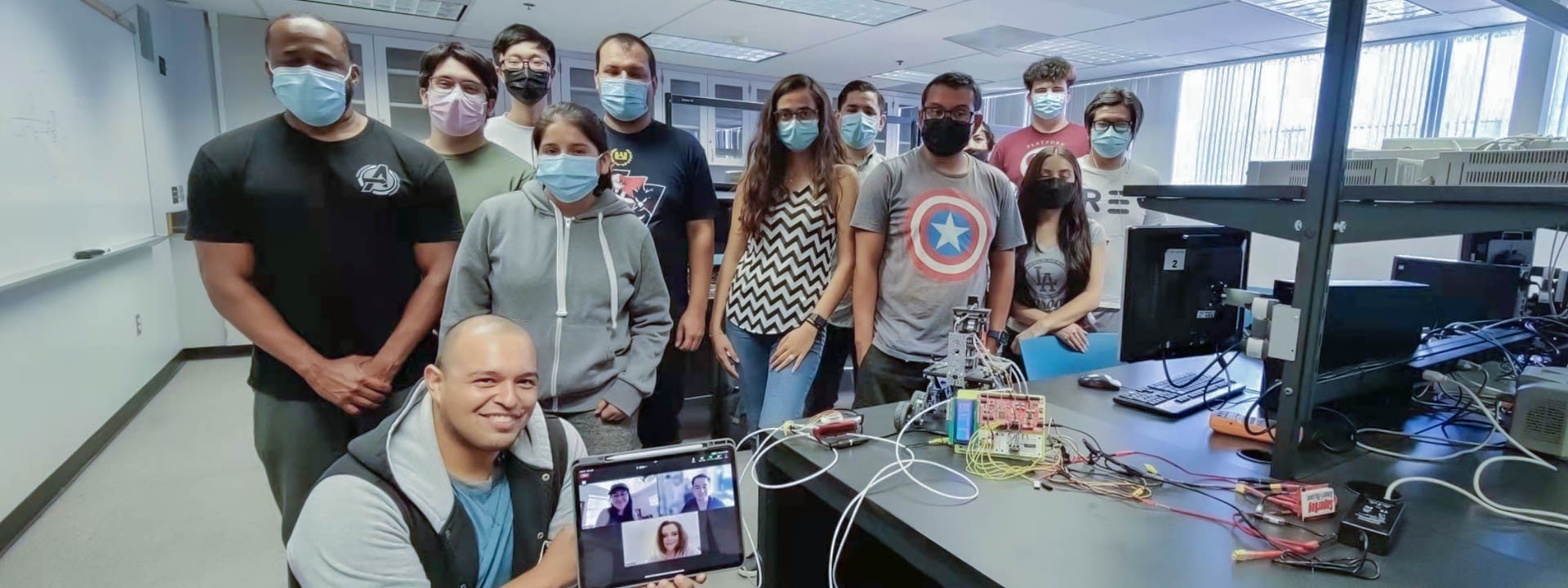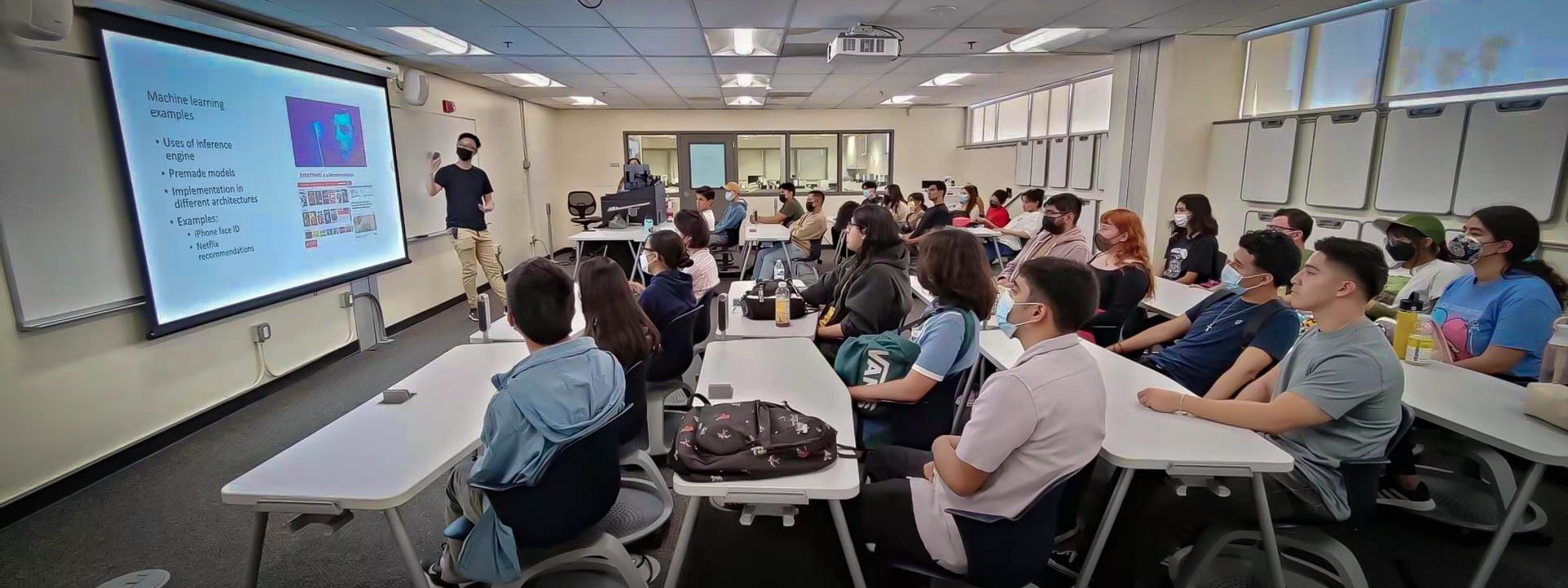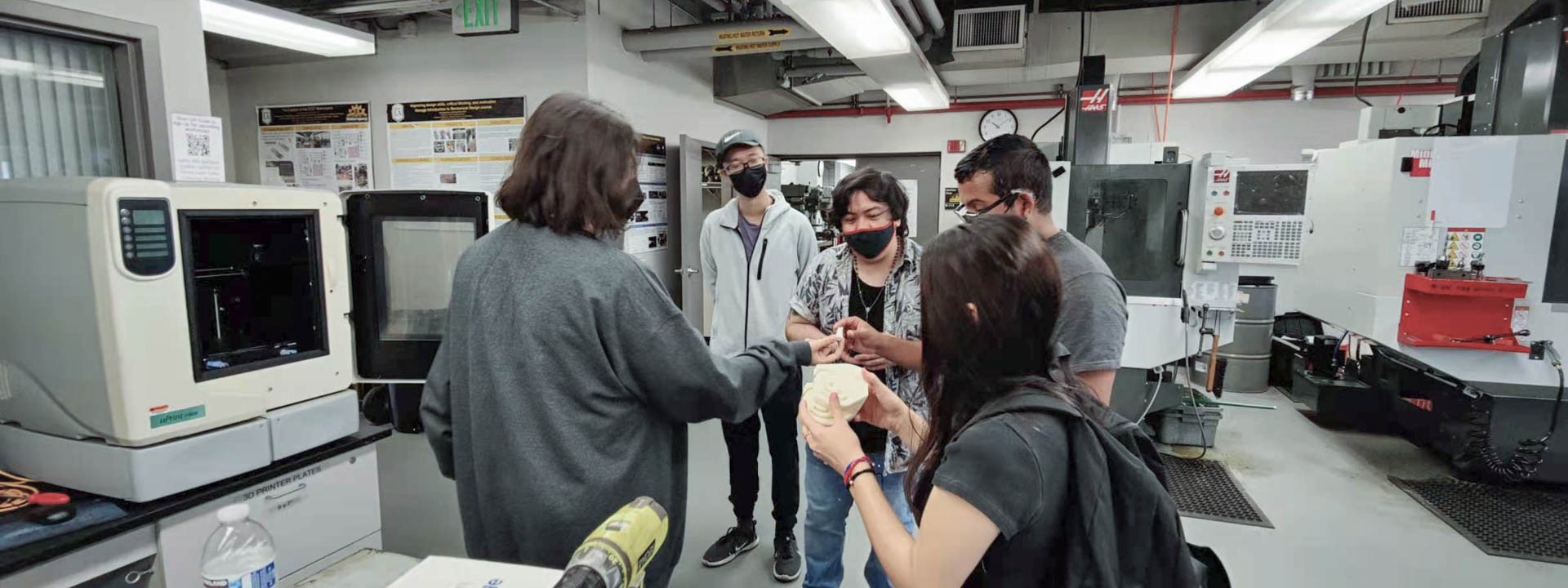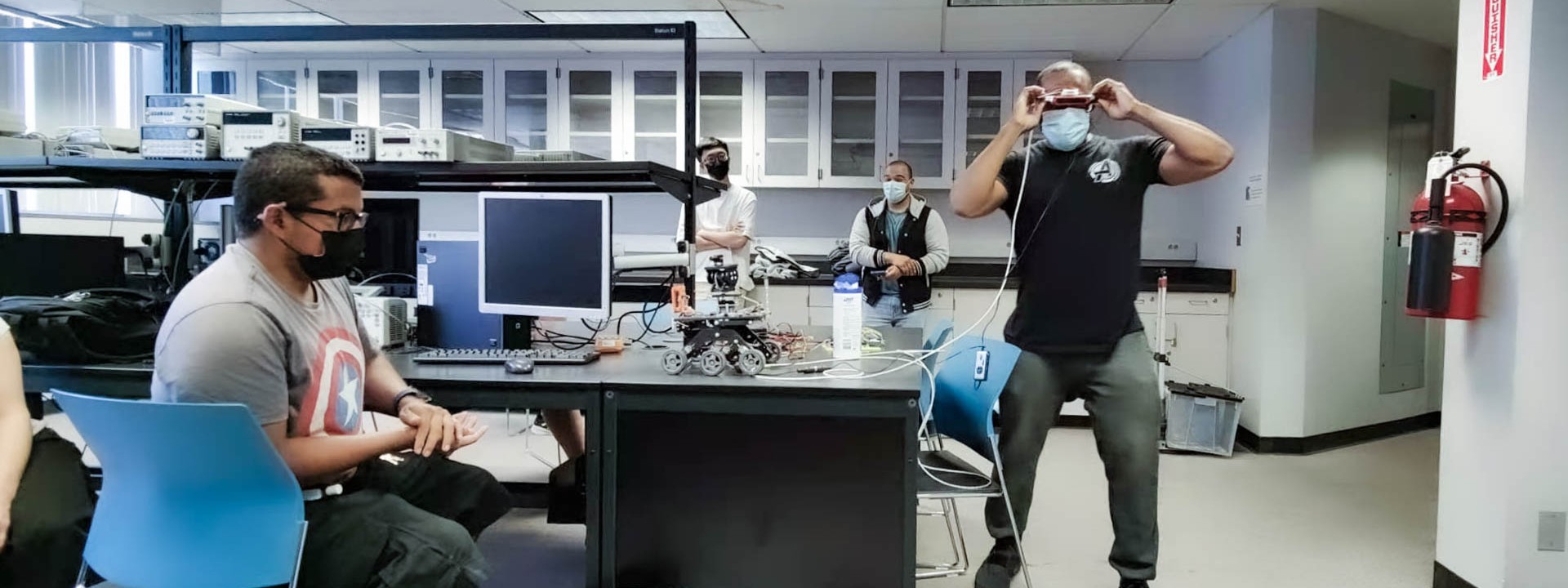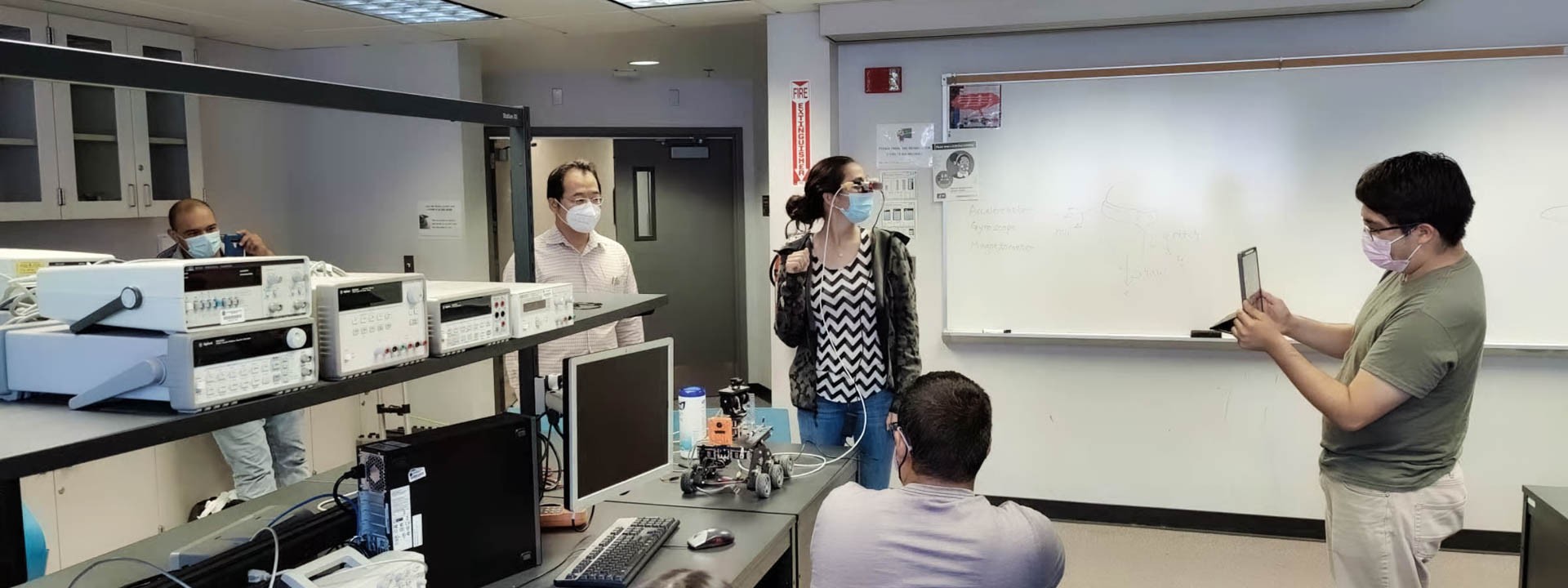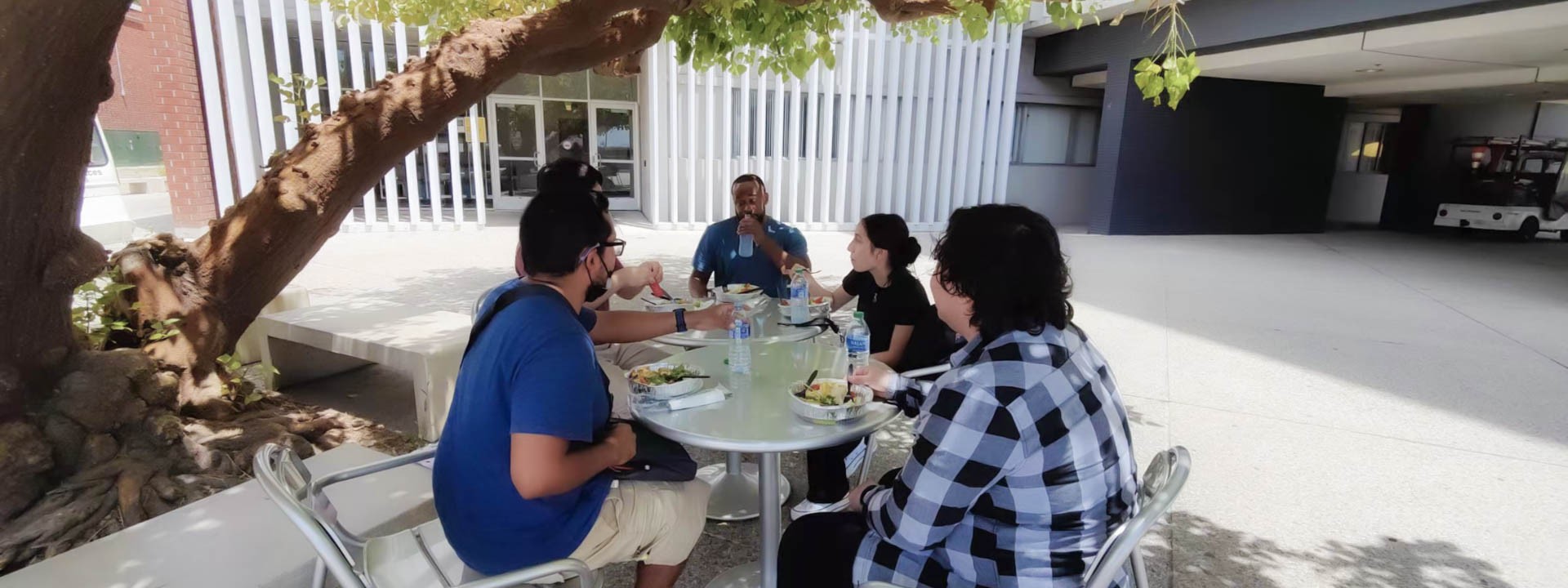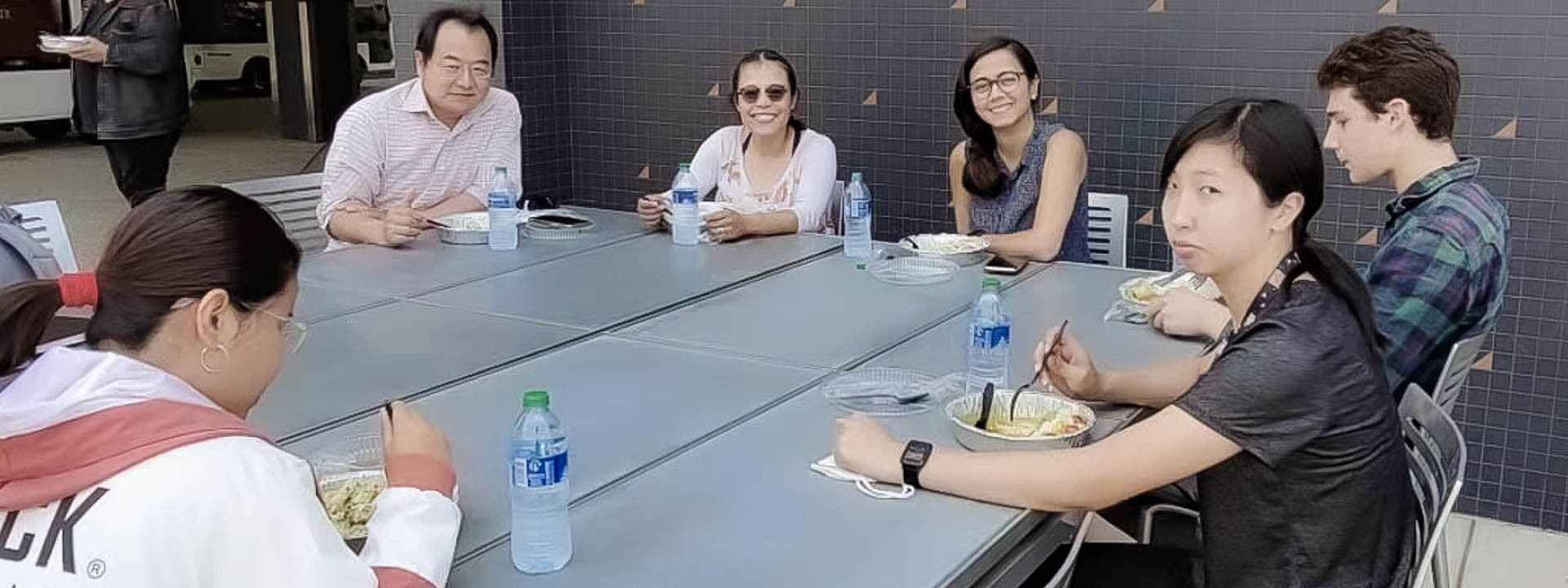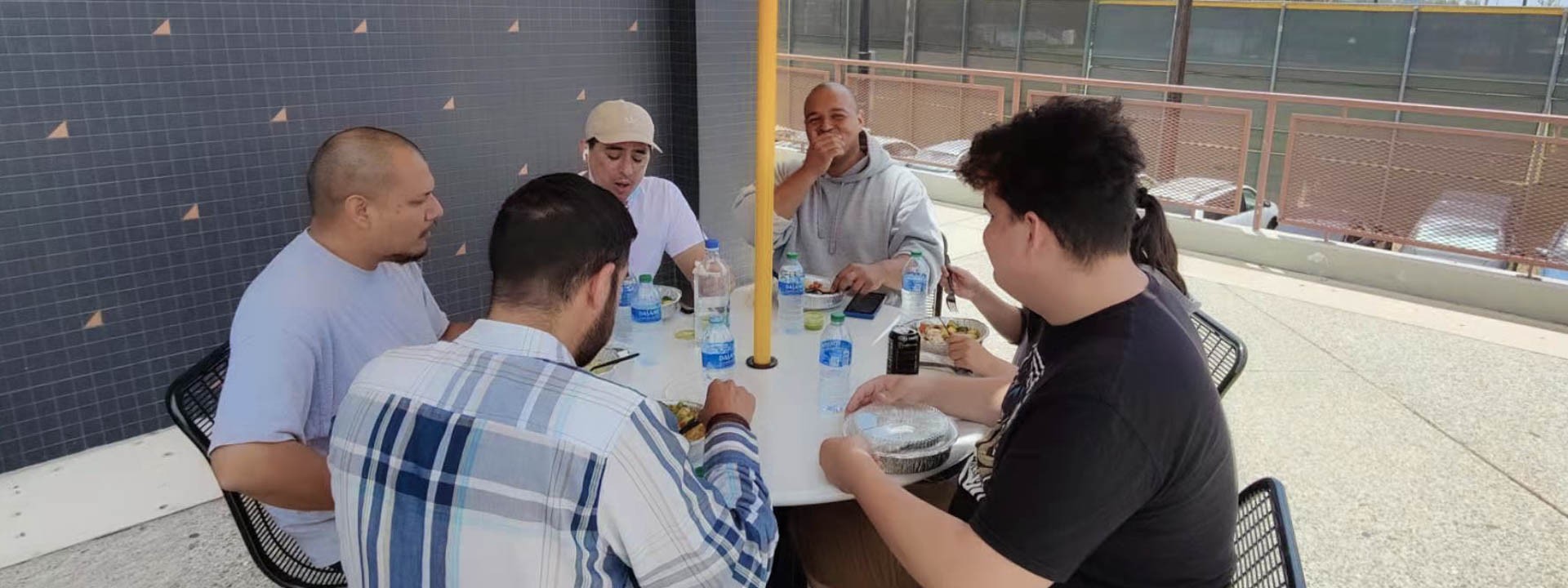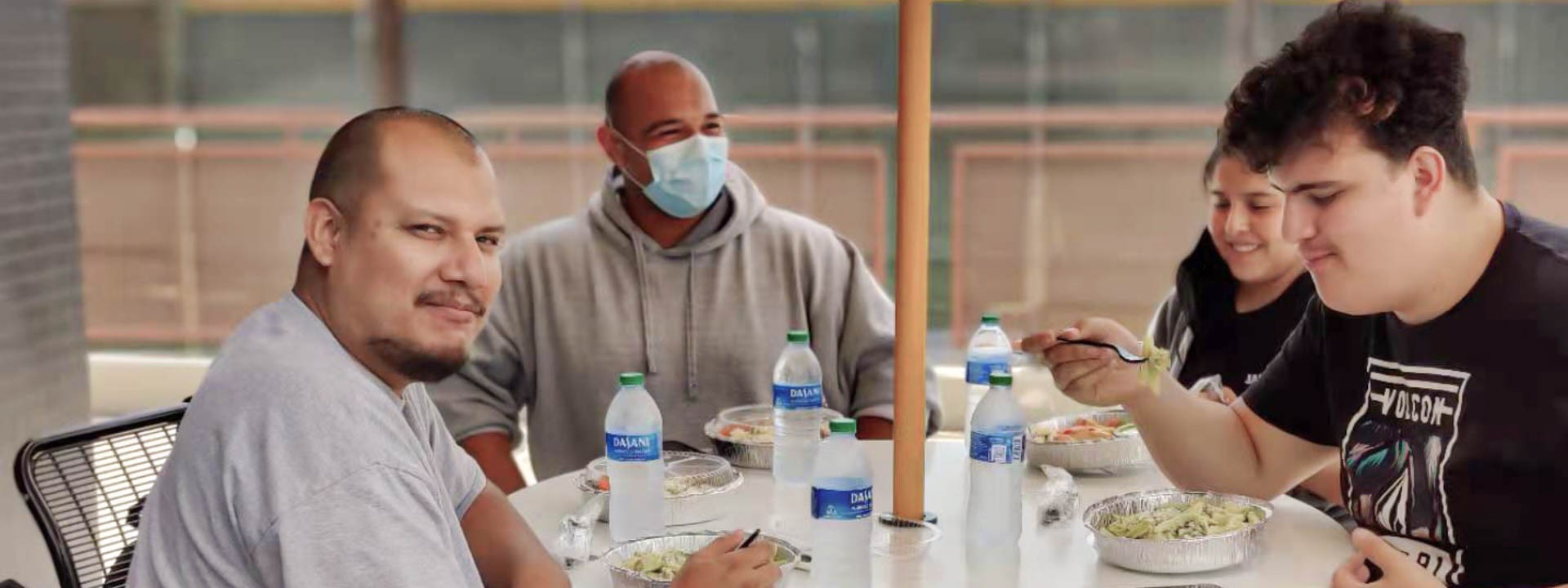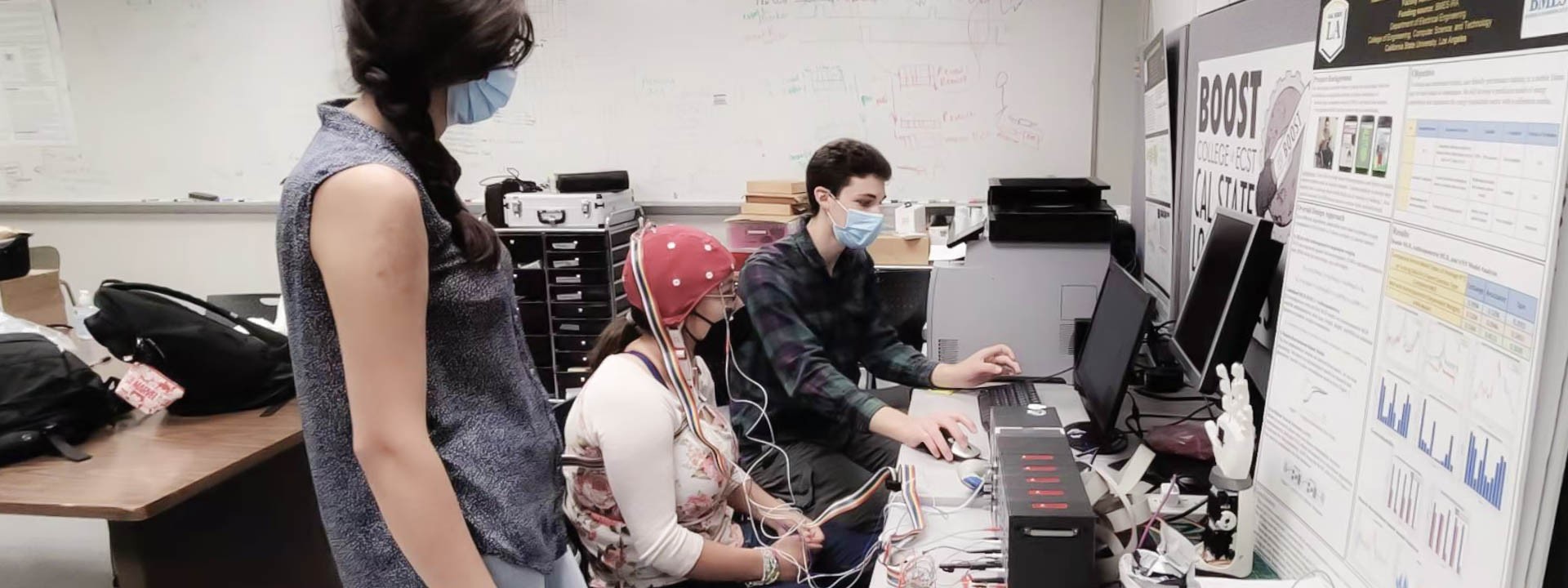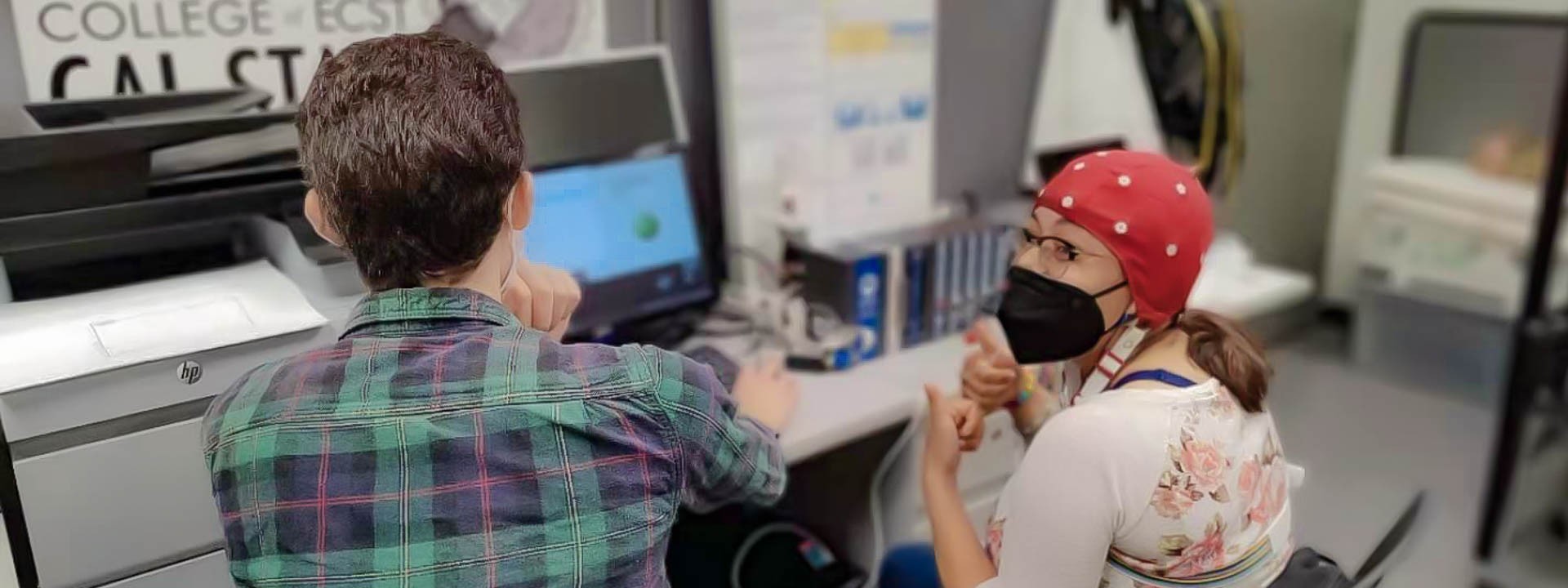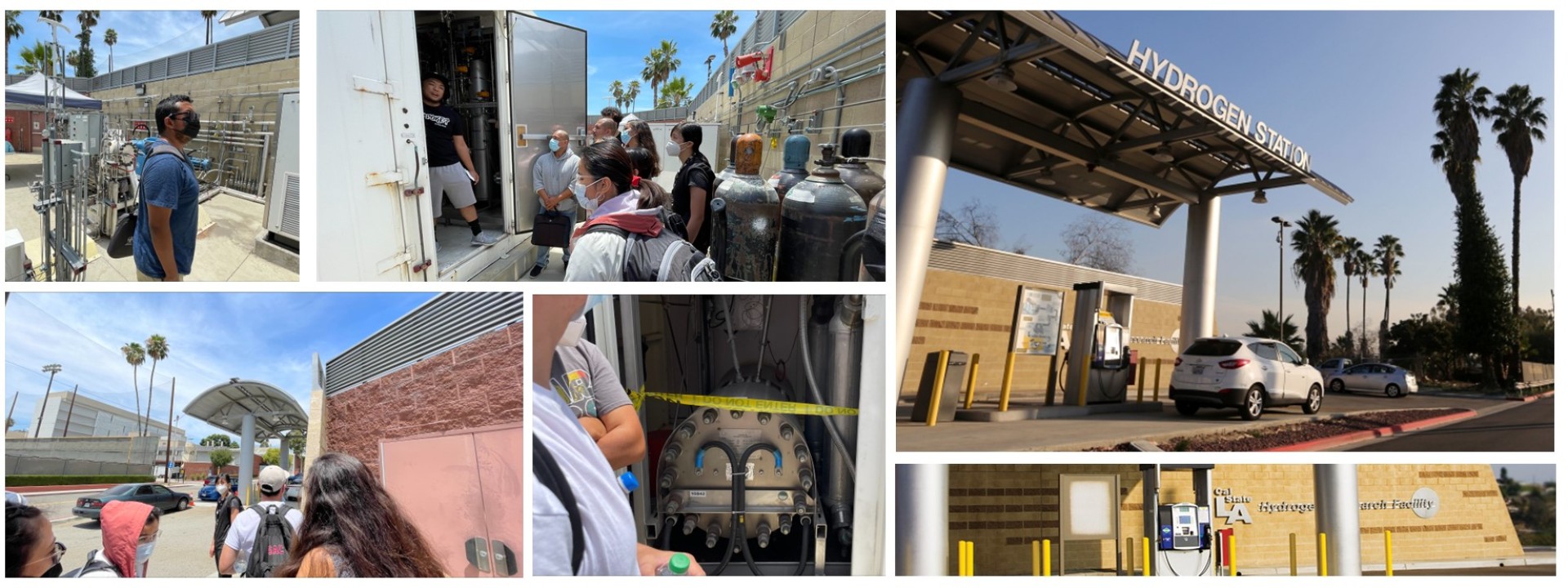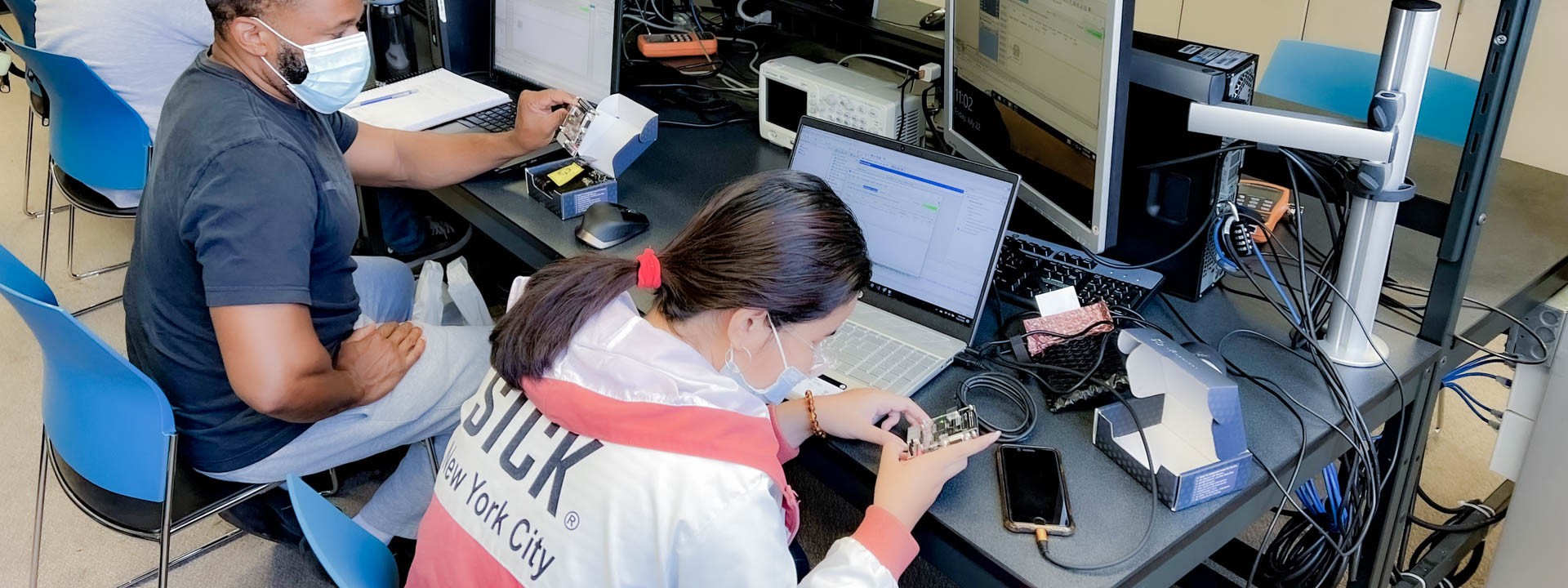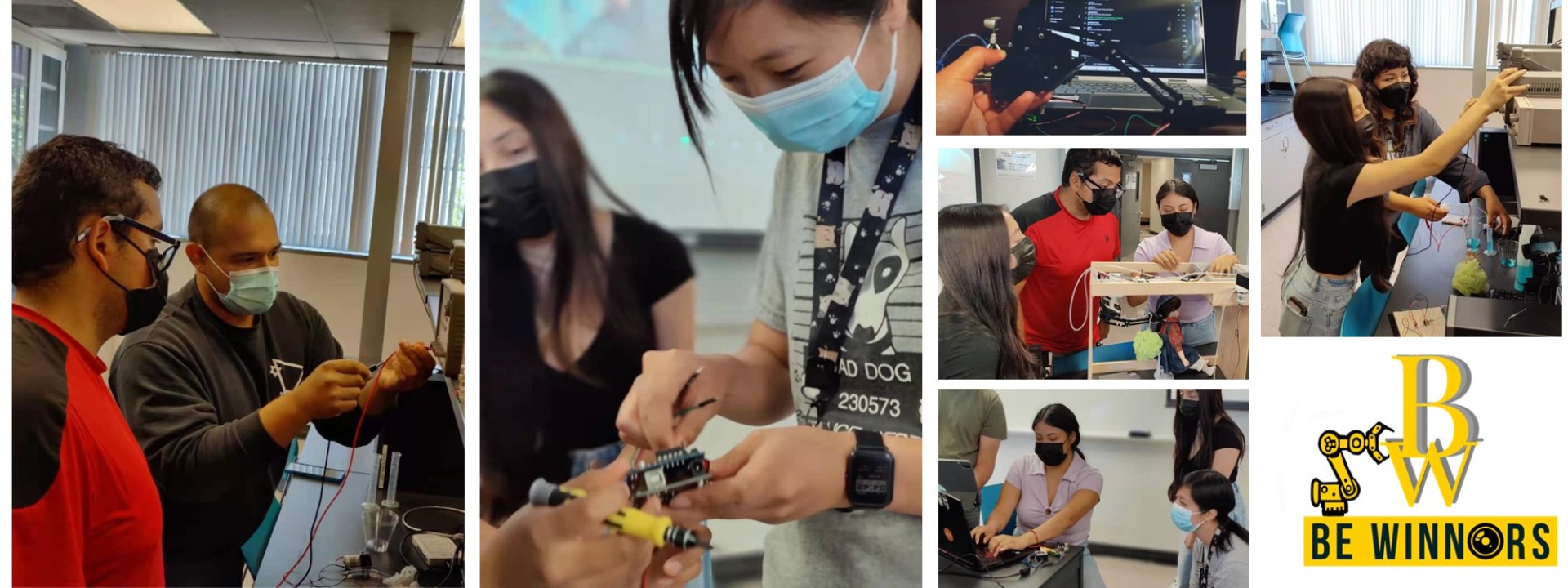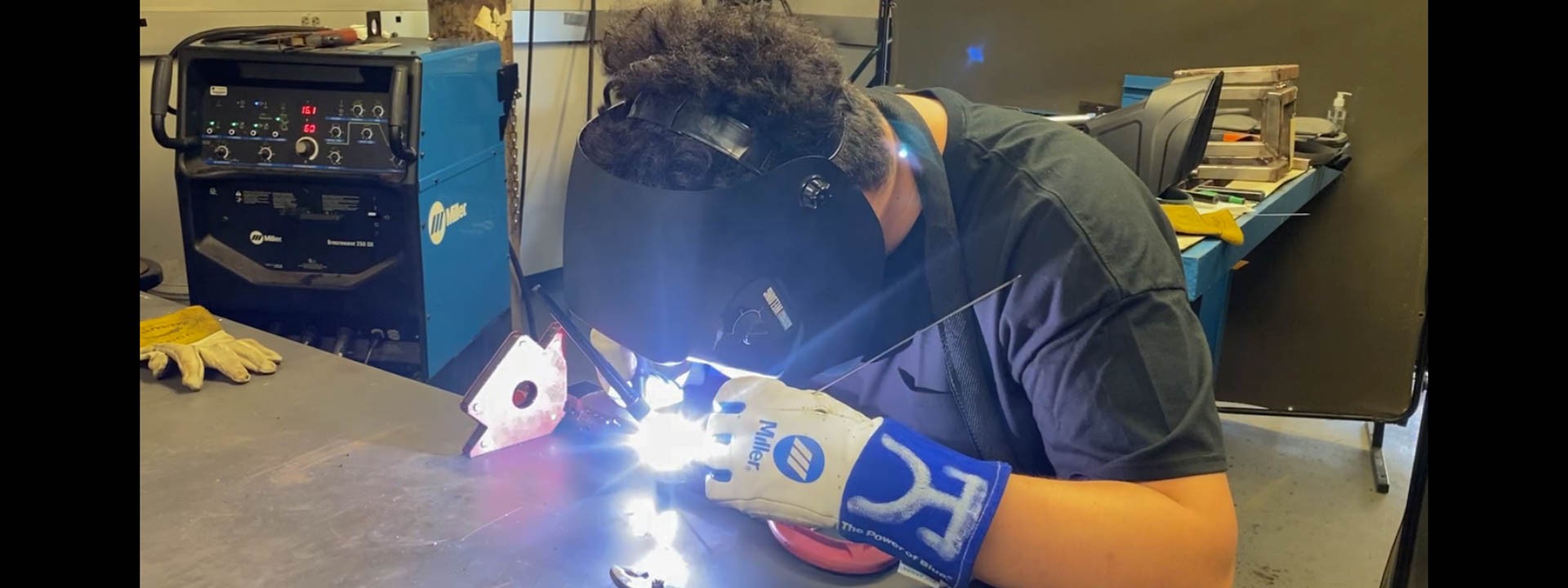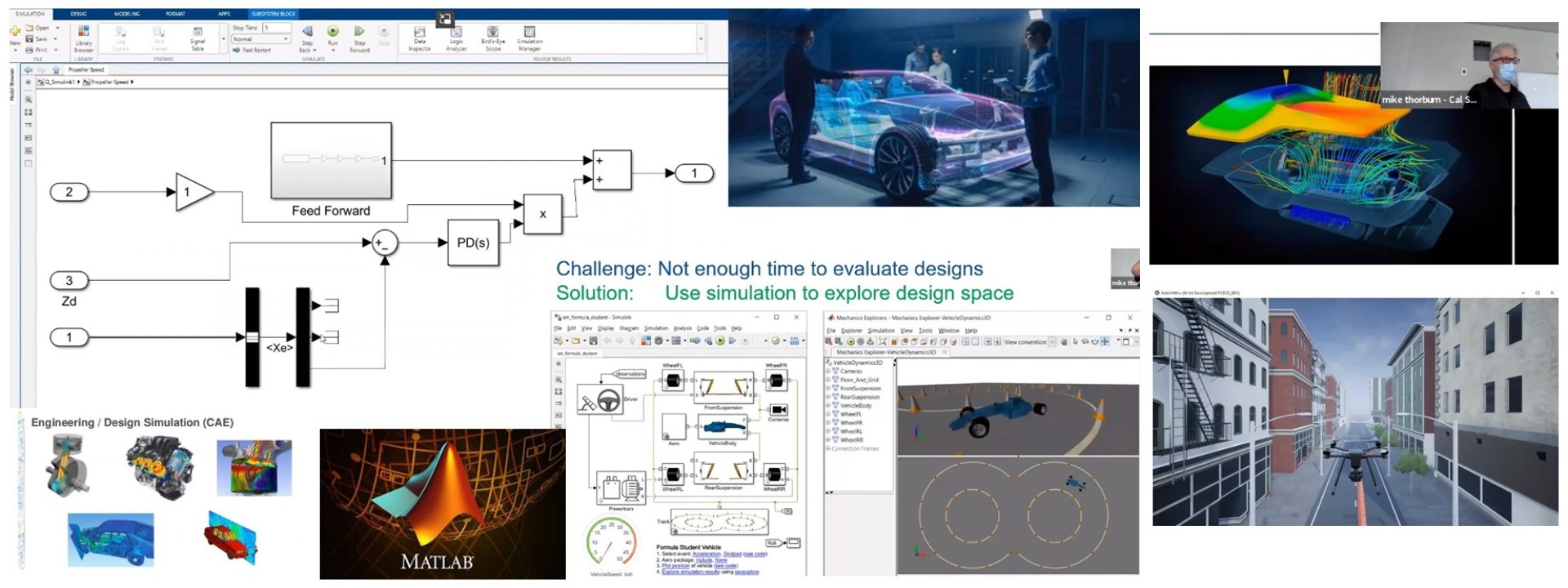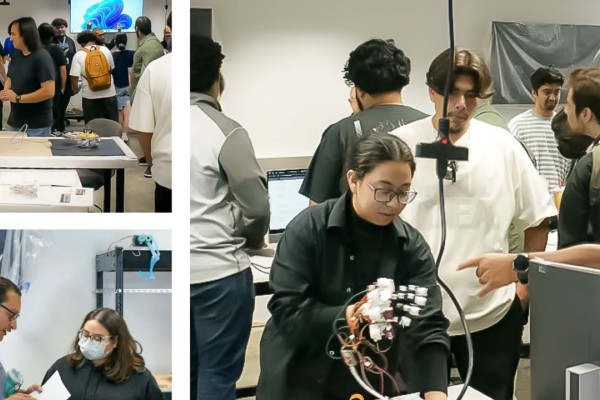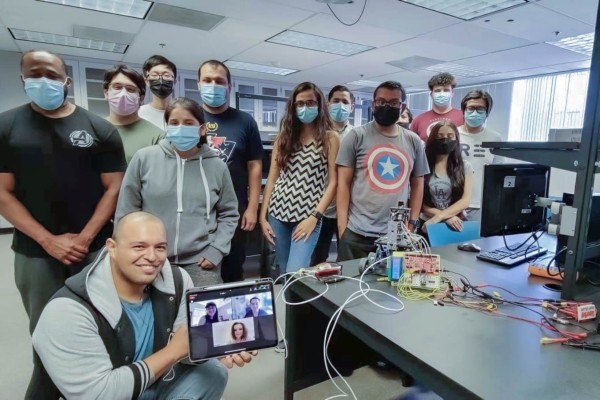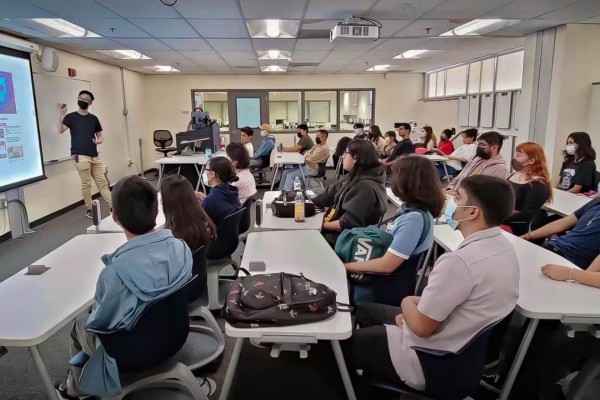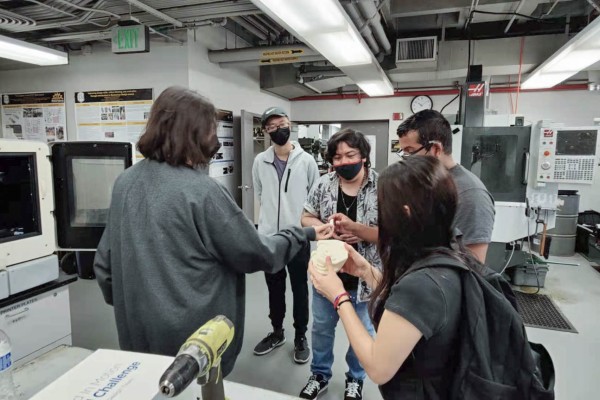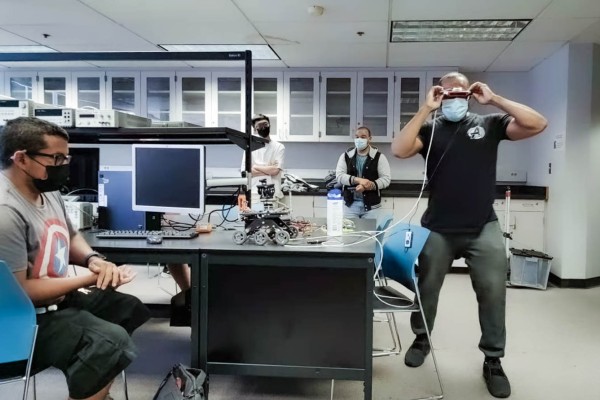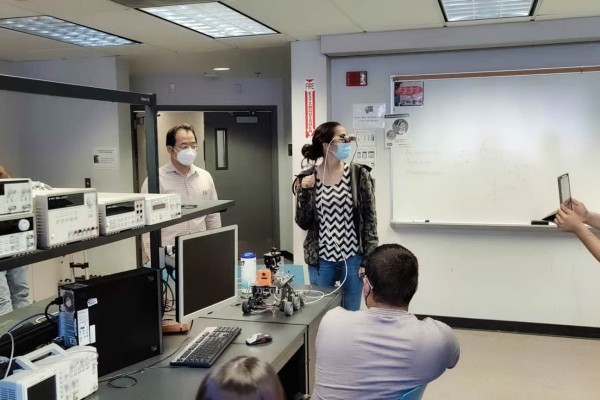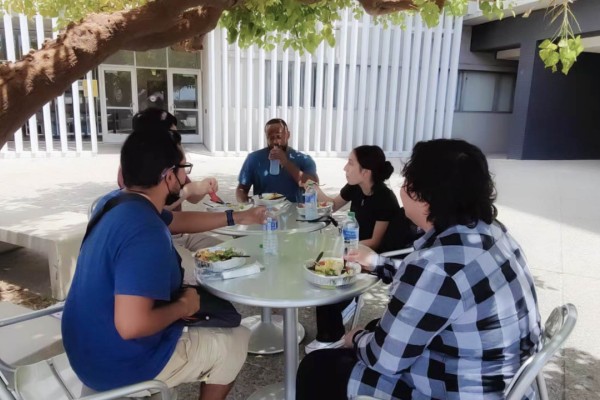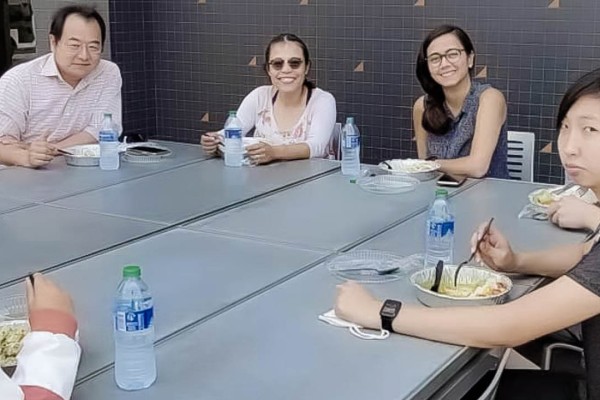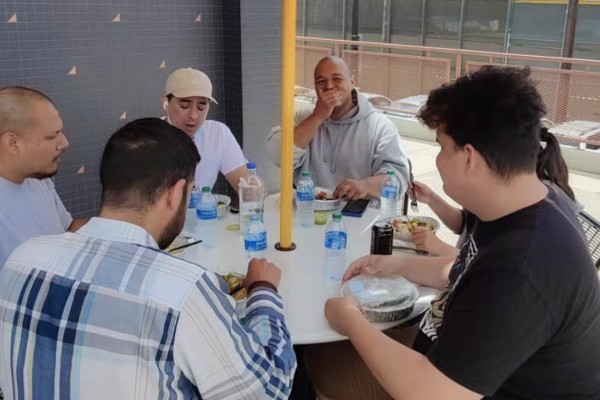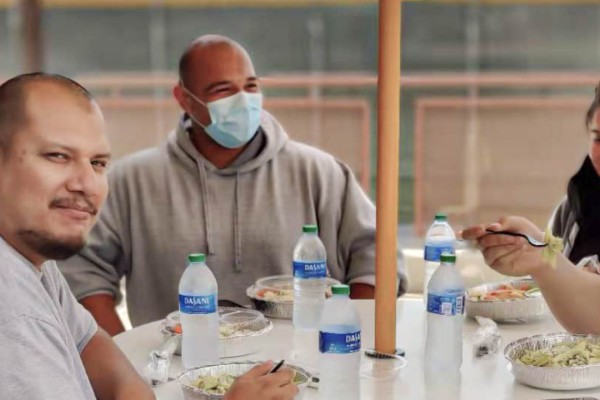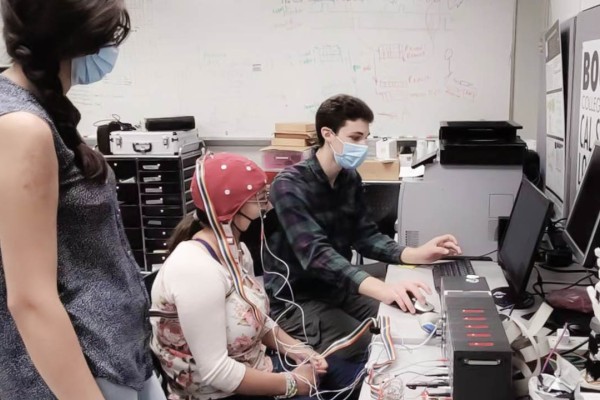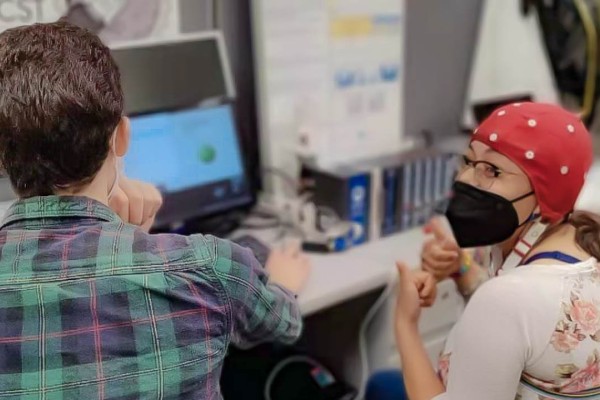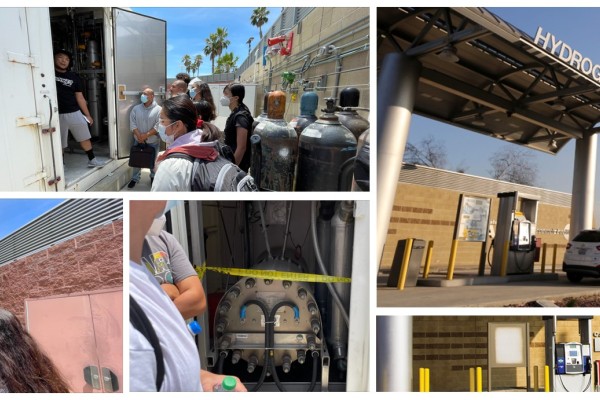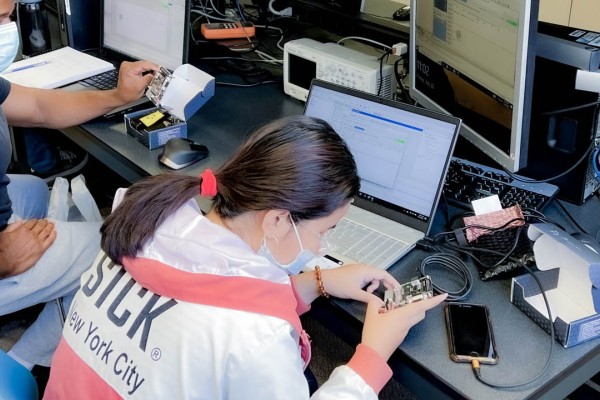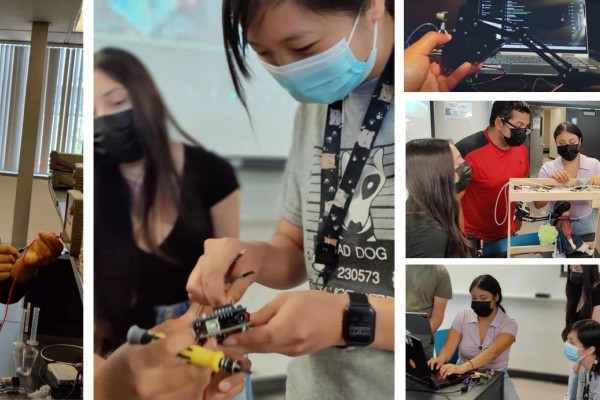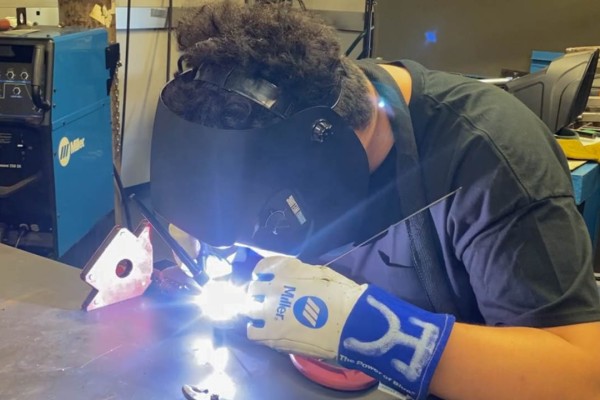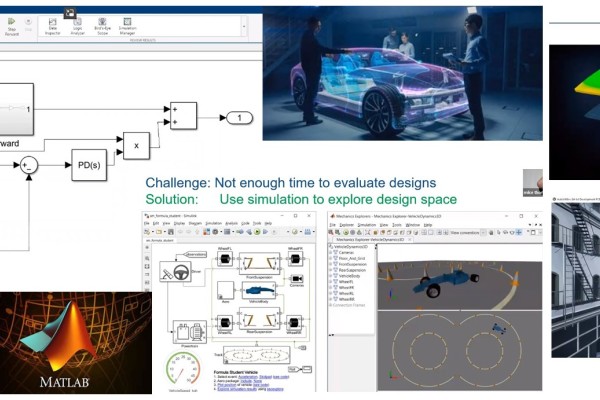Welcome to the SMART Internship Program! Summer Making, Academic prep, and Research for Transfer students (SMART) is an exciting, hands-on internship program sponsored by Growth Sector's STEM Core program and hosted by the Department of Electrical and Computer Engineering (ECE) at Cal State LA.
Designed specifically for motivated community college students with a passion for STEM, the SMART Internship offers a unique opportunity to explore academic and research pathways in a dynamic summer setting. Participants engage in immersive workshops, collaborative projects, and cutting-edge research activities, all while building the skills and confidence needed for a successful transfer and continued academic success.
Join a community of future engineers and innovators, gain valuable experience, and make this summer count with SMART.
Sponsored by STEM CORE, 56 SMART interns from community colleges participated in workshops and educational/research activities hosted by the ECE Department at Cal State LA during summer 2022-2024.
Events + Activities
What's Involved
Time Commitment and Program Expectations: Learn more about the SMART Internship’s hands-on workshops, faculty-mentored research, and elective activities designed to support your STEM journey and transfer success.
- Workload - 30 hours per week
- Learning format
- Self-paced workshops – 20 hours
- Graduate-assistant hosted weekly meeting (remote or in-person)
- Graduate assistant office hours
- Subject: Intel DevCloud – machine learning applications
- Workload – 10 hours per week
- Learning format
- Each intern was assigned to a participating research lab based on the interns academic major/interests.
- Each faculty research advisor and their TAs met 2 hours per week with the interns.
- The faculty advisor of the research lab assigned tasks to the interns based on the research activities and the interest of the interns.
Robotics Design Demonstration - hosted by Dr Charles Liu, and Professor Airs Lin
Makerspace Tour - hosted by the ECST Makerspace graduate assistants
Transfer Pathways Preparation; Peer Advisement; Luncheon - hosted by Dr. Charles Liu and the ECST peer mentors from the Successful Transfer and Retention (STAR) Pathways program
Biomedical Engineering (BME) Research Demostration - hosted by the BME lab assistants
MATLAB Toolboxes Demonstration - hosted by the ECST MATLAB Model-based Design (MBD) graduate assistants.
Research Activities
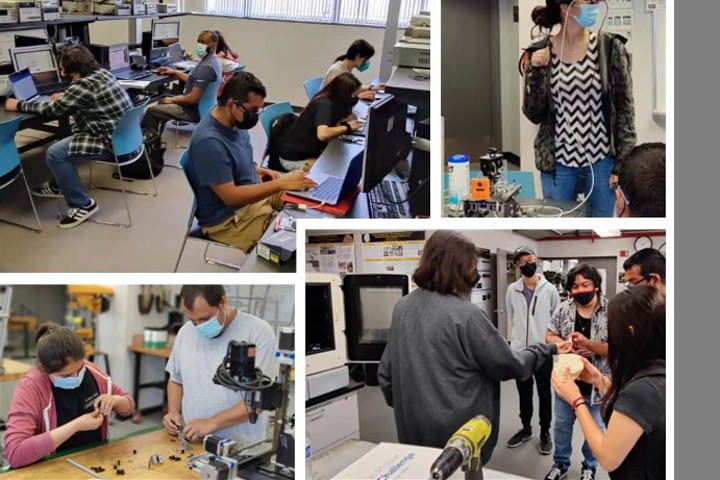
The SMART interns worked at the ECST Makerspace to learn how to use and repair manufacturing equipment, design and build tools and equipment, and interact with Cal State LA students on their design projects.
The SMART interns worked with the Electronics Makerspace Lead Student Assistant to create a safe, welcoming, creative, and innovative environment for students. They had the opportunity to design, build, and test various devices to facilitate an electronics makerspace, such as electronic wall displays, equipment checkin/checkout systems, and demonstration projects.
The SMART interns worked in the IntelliMed lab on two projects: 1) collecting and analyzing wireless surface EEG data and comparing the signal features with ones predicted from a finite element model for various tasks and under various conditions. Interns working with human subject data needed to undergo human subject research training. 2) search for patterns in brain (electrocorticogram) signals recorded from rodent subjects induced with a model of stroke to determine if and how certain signature electrical events spread and change across the brain and over time. Students met with the larger group on a weekly basis to hear updates on all the projects in the lab, including one on deep brain stimulation.
The SMART interns worked in the Object-Oriented Programming Lab to develop various software using Python. They learned the concept of an abstract class, encapsulation, inheritance, and polymorphism to provide great flexibility, modularity, and reusability in developing software. Also, they learned to program with abstract classes, class inheritance, polymorphism, and exception handling.
The SMART interns worked in the Embedded Architecture Lab for the learning of Verilog programing and receiving the hands-on experience of the innovative technologies to the development of an embedded system using Field Programmable Gate Arrays (FPGA). They also learned the concept and the applications with thread-level parallel processing.
SMART Intern Insight
Curious what it’s really like to be part of the SMART Internship Program? Meet the exceptional community college students who took the leap, challenged themselves, and are now shaping their futures in STEM.
Computer Engineering and Computer Science SMART Interns
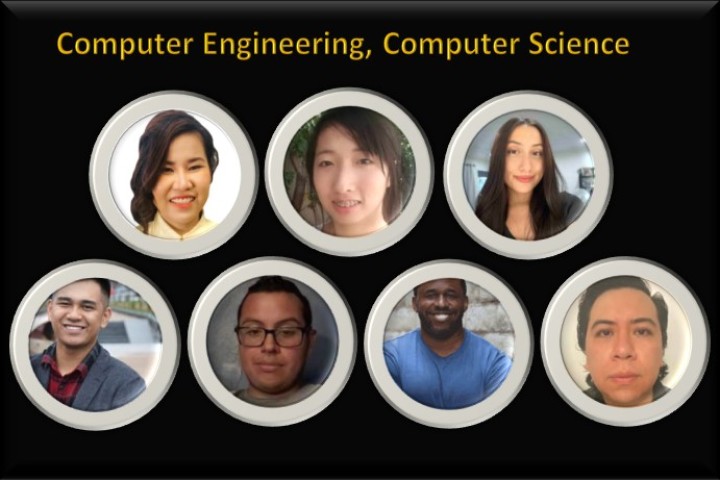
I am a second-year student at Seattle Central College. My major is computer science. In the SMART Program, the most helpful things about the internship for me are:
• Going over the basics of python.
• Having a real coding project to work on
• Being able to get help from very knowledgeable people and mentors.
The internship helped me in understanding coding/programming in a better way, and actually being able to see what a real developer environment is like. I learned a lot about code and how it works through the several projects we did.
Doing the SMART Internship really opened up my eyes. Being able to create things with software is cool, and figuring things out and getting them to work after a lot of trial and error is very gratifying.
I am a student at East Los Angeles College. My major is Computer Science, but might need to do some reconsideration if I should get in minor in something else too. In the SMART program, the most helpful topics are:
- Python
- Jupiter Notebook
- Anaconda
I think the program has helped me in my endeavor in computer science better than I would have by myself or school. I have no experience when it comes to programming, so getting some experience and help in this internship has given me more insight than I would have on the first day of the internship.
I got inspired I should see other field beside computer Science, but at the same time I think I should get a bachelor’s degree and maybe a minor or something first to contain some sustainability before I try reaching out for other fields and trying too much. Just wonder if having a degree in Refrigeration can help me a bit here?
My name is Royce Jamerson, and I am a second-year student, majoring in Computer Science, at Pasadena City College. I was a part of the STEM Core Internship at Cal State Los Angeles. A day during this internship usually consisted of me learning and implementing various technologies within the computer science, computer and electrical engineering fields. Technologies such as Intel AI DevCloud for machine learning applications, GitHub, Jupyter Notebook, Linux, and FPGA just to name a few. As well as various programming languages, such as Python, Verilog HDL and C++. The thing I enjoyed most about my internship experience was the fact that I got to dive deeper, and learn more, about various subjects within and around my chosen field of study. Starting up a new semester is the next near plan for me. I will be taking a few of my first actual computer science courses this fall, and I feel way more prepared for that challenge, due to my experience with the internship. My goals are to continue my journey in order to finish my degree, after that, jump into the tech industry and one day, start and build my own firm. If I could give any advice to the next group of interns, would be to pay attention and ask a ton of questions of your mentors and the TAs. They are extremely knowledgeable and are amazing assets to help you on your journey.
I am a junior-year student at East Los Angeles College. My major is computer engineering. In the SMART program, the most helpful topics are:
- Python
- Linux
- Intel DevCloud
I entered this internship not knowing much about programming (little to no experience) but was excited to learn python and Linux. Learning Python helped me strengthen my programming skills and Linux became a useful tool. I enjoyed using the tutorials on Intel DevCloud and being able to visually see the outputs of the codes for me to understand it better. Now that I have more experience with programming, I feel more confident in being able to move forward with my major program. Since I am transferring, I am looking forward to seeing what my knowledge will allow me to achieve in the next few years.
This internship inspired me to learn other programming languages that are useful towards my field, as well as gaining more hands-on experience. I liked how I was exposed to other majors like mechanical and biomedical engineering, which gave me a well-rounded idea of what skills they need for their field and how programming is involved in everything.
I am a sophomore-year student at East Los Angeles College. My major is Computer Science. In the SMART program, the most helpful topics are:
• Learning about computer vision
• Learning about embedded systems
This program benefited me greatly because I gained valuable knowledge in computer vision which is an area of computer science I would like to specialize in and now I am much more confident about it because now I have gained some experience.
I am very interested in pursuing research in the field of computer vision now because I was so interested in it thanks to the internship that I would like to learn more about it.
I am an incoming transfer student at University of California, Los Angeles. My major is Applied Mathematics. In the SMART program, the most helpful topics are:
- Electronics makerspace
- Object-Oriented Programming
- Embedded Architecture Lab
During the Embedded Architecture Lab, I and the computer science team use Quartus Prime Standard and Verilog HDL to program and implement the code into the DE10-Lite FPGA board with different binary values setting to test the decimal value on the seven-segment displays and compare the signal features with ones predicted from a finite element model for various tasks and under various conditions.
In addition, we also learn and use Python, OpenCV, and mobilenet-ssd to create a bird watcher project experimented with benchmarking to study the machine learning application.
You may refer to the following page for what you have learned in this program.
I am a sophomore year student at East Los Angeles College. My major is computer science. In the SMART program, the most helpful topics are:
- Image classification
- Programming in Python
- Logic circuits
- Parallelism
The lower-division courses for my major, computer science, is largely based on mathematics and physics, so much of my appreciation for the CSULA internship lies in being override this educational constraint. I can experience the interior and exterior of the field directly: learning how to perform image inferencing with Python while dipping a bit into mechanical and computer engineering.
Since the mixture of in-person and online classes gave little opportunity to meet students with major, I am inspired to research recent developments and achievements in the field to acquire a wider perspective.
Electrical Engineering and Biomedical Engineering SMART Interns
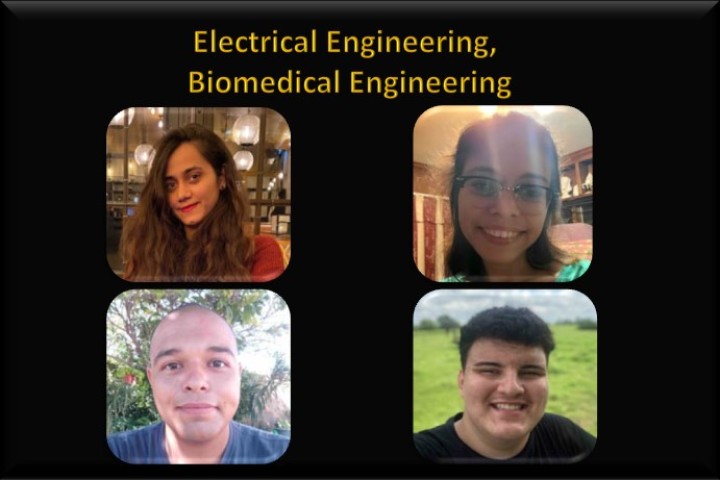
I am a sophmore-year student at Santa Ana College. My major is Electrical Engineering. In the SMART program, the most helpful topics are:
- Coding
- Throughout the internship, we were introduced to Python and Linux, the former being a coding language and the second an operating system. Both have exposed me to and shown me a different perspective on how our world works today. This exposure has shown me the limitless possibilities that coding provides. Even though the learning curve can be steep, the possibilities are endless. I've learned more about it throughout this internship, and if someone asks me about it, I now have the basic knowledge to engage in a conversation and possibly help with some problems.
- Research
- In addition, through this internship, I learned how to use Excel to catalog electrical components and contributed to transforming an abandoned room into a welcoming space for others to learn or create. We might not have had enough manpower to finish setting it up, but the electrical components I was exposed to were a great opportunity. Finally, having the opportunity to build and calibrate a 3D printer was a privilege.
- Inspiring
Overall, this internship has broadened my horizons and expanded my skill set and knowledge. With this newfound knowledge, I know that this is the career for me. Having the opportunity to gain hands-on experience has changed my life. I know I want to continue working on my electrical engineering degree!
I am a sophomore year student at Saddleback College. My major is Biomedical Engineering. In the SMART program, the most helpful topics are:
- Different Workshops; Makerspace, Hydrogen Station
- Research opportunity at Lab
- Learning Python
This program helped me realized that I do really enjoy working in the lab as a part of a team and I have chosen the right major to continue. I learned how to work with EEG machine, collect and analyze signals from a human subject’s brain. At the different workshops that we had during the 8 weeks program I got the chance to get familiar with different machines and tools that I will need to use in Engineering field such as 3D print, Milling tools and etc.
I will continue my education in Biomedical Engineering with a focus on Bioelectric and Neuro Science, and look for getting more hands-on experience while completing my academic education.
I am a freshman-year student at Pasadena City College. My major is Electrical Engineering. In the SMART program, the most helpful topics are:
- Variable functions
- Print statements
- Python API
Based upon the learning experience I received in the S.M.A.R.T. internship program, I have decided to still continue my pursuit in Electrical Engineering while now including courses that involve Computer Engineering. The reason for this decision comes from studying the relationships between hardware and software over the course of this summer. As well as, to become familiar with different coding languages that are used for modeling input and output computation processes within machine learning, controllers and sensors.
The S.M.A.R.T. internship activities that have inspired me to further explore other major fields which develop my professional career in Electrical Engineer were learning about how 3D printers work, how to utilize Fusion 360 to design products that could be 3D printed and the coding languages that function between them like Python.
I am a senior year student at Santa Ana College. My major is Occupational therapy and Minor Biomedical engineering. In the SMART program, the most helpful topics are:
Understanding Python as the programming language to manipulate images, understand algorithms, and create universal codes.
Analyzing EEG data was a tough subject, however this challenge helped My skill to detect spreading depression, noise reduction, and different level of frequencies.
Research journal exploration helped understand the importance of credibility, time processing, and specifications.
Participating in the SMART internship helped me understand programming, which will be useful to know how to manipulate coding. Part of being an engineer entails learning a new language of coding. Python is one of the easiest languages to understand compared to C++. However, programming is not everything especially as a Biomedical engineering we focus in improving the medical field. Therefore, there is a lot of research to understand and being part of the intellidMed research was a blessing. I learned what it means to be a biomedical engineer. After learning python in the SMART workshop the application was used to understand coding in the intellidMed research.
IntelliMed lab inspired me to understand disabilities in a biological, chemical, and technical way. I was inspired to gain information from journal articles to improve research and to understand patterns of electrical impulses. I learned to observe for any improvements or the spread of depression on brain tissue. IntelliMed lab and SMART helped me explore the importance of technology and research discoveries in the medical field. In the future, these acknowledgements will improve my skills to invest time in as it will always be a skill to know when following my career path.
Mechanical Engineering and Aerospace Engineering SMART Interns
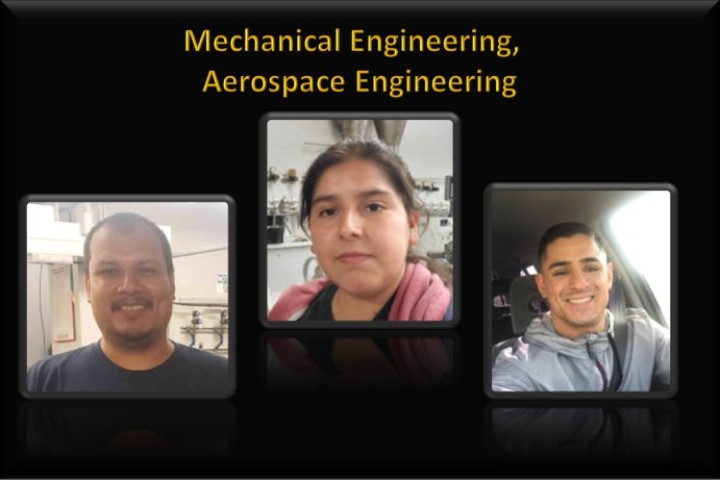
I am a sophomore-year student at Santa Ana College. My major is Wildlife Biology. In the SMART program, the most helpful topics are:
- Teamwork
- Coding
- Commitment
This learning experience has been incredible. I got to experience being part of a team. Working together on a project in Intel AI DevCloud. It was great to get involved in machine learning. This has inspired me to work hard and continue this coming school year.
During the internship, the ECST Makerspace gave me the opportunity to bring my ideas to life. I had the chance to design my very own license plate frame and laser cut it. Being able to do this was awesome. This has inspired me to create useful tools that I might use in my field.
I am a sophomore-year student at Santa Ana College. My major is Mechanical Engineering. In the SMART program, the most helpful topics are:
- Learning to use lathe machines to cut and shape metal pieces to produce workpieces for a desired product. I was able to build an aluminum flashlight out of a metal rod.
- I was able to use a laser cutter and engraver to engrave an image into a wooden piece and make acrylic keychains.
- I learned about Linux and Python, and learned to code
The learning experience in the internship program was great. I learned more about 3d printing and purchased a 3d printer to continue experimenting with 3d prints after my internship and continue to improve my skills. It gave me more confidence to try building small projects at home. I will also look into enrolling in other programming languages at my current school to familiarize myself with other programming languages. It was a short and quick experience, but I will definitely look to apply for another internship next year.
Aerospace Engineering student from Santa Ana College.
Industrial Engineering and Chemistry SMART Interns
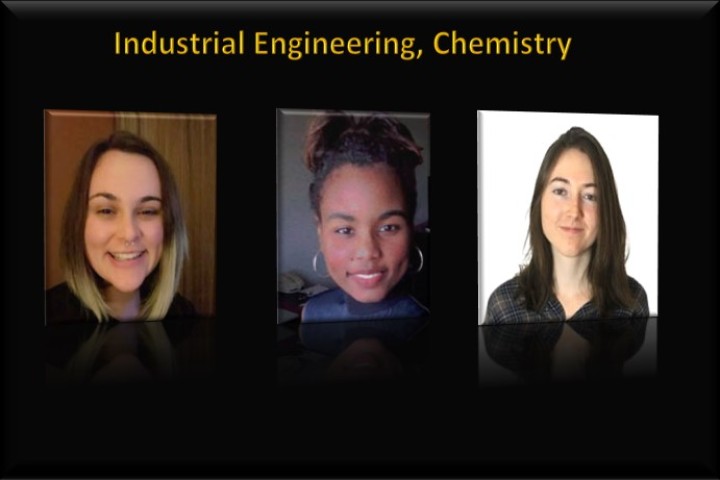
I am a sophomore-year student at Palomar College. My major is Chemical Engineering. In the SMART program, the most helpful topics are:
- The research program (A big thank you to Dr. Won!).
- The end of the internship team presentation.
While I am not a computer science major, this internship position was still incredibly valuable in learning how a research team collaborates towards the desired goal. I was able to assist in designing and participating in the research experiments, which provides experience that is applicable to all STEM majors.
This program helped me carve out my natural skills and abilities that will better my career, such as organization, researching, and effectively collaborating with team members.
I am a sophomore student at Seattle Central College. My major is Industrial Engineering. In the SMART program, the most helpful topics are:
- Intel AI DevCloud – machine learning applications
- Introduction to Biomedical machine learning applications
- MATLAB applications
The internship was awesome. I loved working with Dr Won in the research projects. I especially liked the Launchpad/BE WINNORs project because I got to be in the process from the very beginning to the end and could actually be part of arming the workshop, so thanks to her for guiding me through all that that for sure contributed to improving my problem solving and creativity skills. I also must give special thanks to Anthony, Dat and Daniel for always helping us when we got stuck with the code or anything, that made a difference in my learning experience. I didn’t have much experience coding and working with linux or inteldevcloud and I am actually considering taking some classes to master my skills in those subjects. I want to also thank Dr Liu for the opportunity and for all the support finding resources for us. They all made the experience awesome, and I think that’s what I liked the most about the internship, the people I got to work with and how much I learned from them.
Majoring in industrial engineering I will be focusing on finding solutions that can help businesses and organizations waste less money and time and use raw materials and manpower wisely while complying with all the regulations and standards imposed by governments. Nowadays, more technologies are introduced to bring higher efficiency. Artificial Intelligence is one of them. Machine learning is a type of artificial intelligence that allows software applications to become more accurate at predicting outcomes and learning how to work with it has been one of the most exciting parts of the internship that will for sure be significant in my career.
I am a junior student at Palomar College. My major is Chemistry. In the SMART program, the most helpful topics are:
- Learning about experimental set-up, interpretation of results, and ethics with Dr. Won concerning DBS
- Building blocks to coding such as linux and python
- Introduction to MATLAB
As a chemistry major, I’ve mostly focused on math and science in the past. This program has shown me how integrated computer science and engineering is to any part of STEM. To become more efficient and create better solutions for the future in whatever job I end up taking, learning coding will be necessary.
Part of my internship was spent working remotely in the IntelliMed lab. Before this program, I didn’t see medical work as a viable path for myself, but the research was both fascinating and valuable.
DISCLAIMER: When you attend a California State University, Los Angeles event, you enter an area where photography, audio recording, and video recording may occur. By entering the event premises, you consent to such media recording and its release, publication, exhibition, or reproduction to be used for news, webcasts, promotional purposes, telecasts, advertising, and inclusion on websites. You further waive all rights you may have to any claims in connection with any exhibition, streaming, webcasting, televising, or other publication of these materials, regardless of the purpose or sponsoring of such exhibiting, broadcasting, webcasting, or other publication.
Contact Information
For additional details or to participate in the program, please contact Dr. Charles Liu at cliu@calstatela.edu.

